George Weidinger
Shortening the War through PO Box 1142George Weidinger was born on the outskirts of Vienna, Austria in 1923. When he was only fifteen years old, the Germans took over his home land in what was referred to as The Anschluss or annexation. George was told he could no longer go to school because he was Jewish, but in reality, he had been baptized a Protestant. It didn't matter to the Germans however, they had determined he was Jewish and that was the end of it. It was also the end of George's formal education. 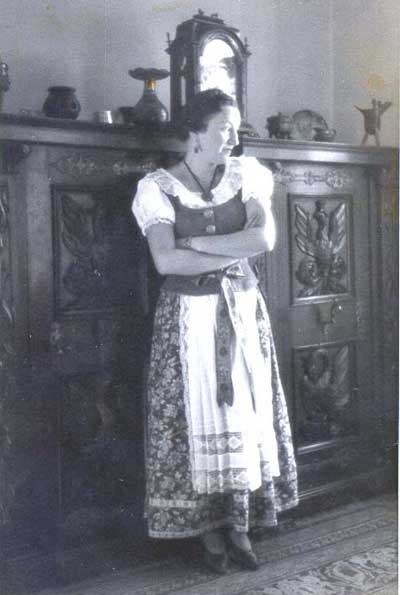
George Weidinger's mother
in their Vienna apartment in 1938
Although he lived in Austria, his father was sales manager for a company that was located in Cleveland, Ohio and the owner of the company, Howard Wise agreed to sponsor George's family into the United States. Leaving Austria and coming to America was not a simple process, even with a sponsor and it was not until a year and a half later that the family received their visa. During that time George, who could no longer go to school, was hired as an auto mechanic and worked there until August 1939 when they left. 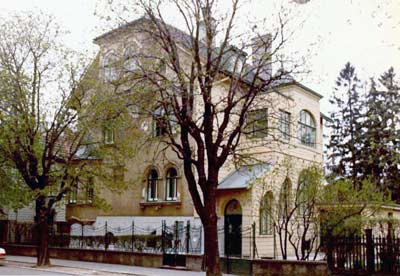
House in Vienna where George Weidinger was born
Of that year and a half he says, "I did not live in the center of town, so I did not have it as bad as some of the others. I never had to clean the sidewalk with a toothbrush." He says the children who lived in the center of town were physically abused and often their parents were thrown into concentration camps, never to be heard from again. 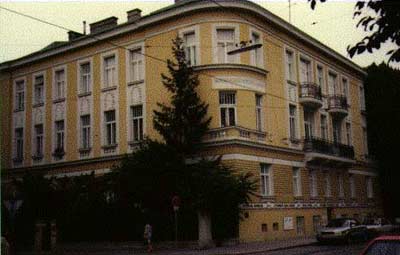
Apartment Building in Vienna
where the Wedingers lived in 1938
He remembers being threatened by an SS officer that his own parents would be put in a concentration camp if he was not able to fix the officers car. He and his mother and brother left for Triest, Italy. They were part of the Austrian quota - the number of Austrians permitted an American Visa. His father was part of the Yugoslavian quota and had to travel through Budapest. George remembers the trip as being horrendous. First, it was held up in Triast because "Mussolini could not decide if he was going to join the war or stay neutral." He recalls a Jewish organization giving them shelter, bread and milk. Once they started off they encountered a storm in the Mediterranean and everyone was sick. They brought huge trunks with them, taking as much of home with them as they could. "The trunks were very large and very heavy and I remember them floating in two feet of water during the storm." In addition, the engine ran on diesel fuel and the fumes alone were enough to make everyone sick. By the time they arrived in Lisbon, Portugal the voyagers could barely walk. They arrived in Cleveland on October 12, 1939. His father arrived two months later on the last ship to leave Europe. They had no family or friends here, just Mr. Wise who told them "you owe me $3,000 and I will not provide you with jobs. Ten years from now you will look back and agree that this was a good decision." Looking back George agrees that it was a good decision and helped lay the foundation for the rest of his life in the United States. Mr. Wise had sponsored approximately 30 other Austrians to come to Cleveland. 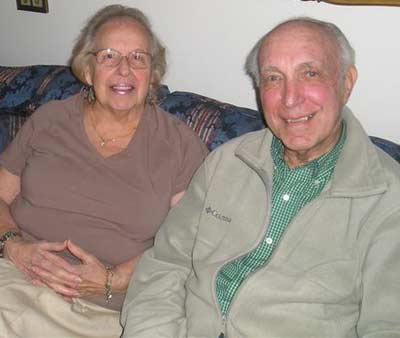
Nina and George Weidinger in 2008
When he came to this country, George was 15 and immediately went to work for the Reilley Corp on Euclid Avenue, owned by Mr. Goodman where they made Pin-Up Lamps. It also happened to be the place he met his wife, Nina, only two weeks after arriving in this country. They just celebrated their 65th wedding anniversary. From there he went to work for Continental Lithograph Co. the maker of outdoor billboard signs. They prepared the zinc plates for photographic equipment and he distinctly remembers that everyone there was German. "They would greet each other each morning with Heil Hitler." When this company was awarded a war contract, George was the one to be let go, because he was an alien. 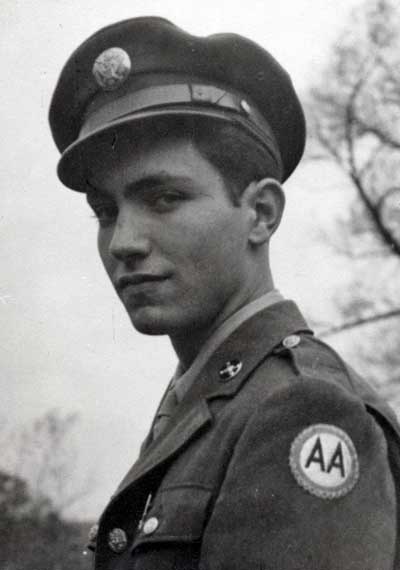
George Weidinger in th Army in 1943
George tried to enlist in the Marine Corps but was turned down because he was not an American so he went to work for Motch and Merriweather on 70th Street and stayed there until he was drafted into the Army. It was while he was stationed at Fort Stewart in Georgia that George became a U.S. citizen.The Army gave George an aptitude test and found his skills were best suited for an office rather than a machine shop, as he had been doing in civilian life. He wanted to put his knowledge of the German language to use and enter military intelligence but was turned down. In the meantime, a man who had worked with his father in Vienna came to this country with his son who was in the Air Force. The son had been stationed at Pearl Harbor during the attack and was now on his way to Fort Hunt, Virginia. He was ultimately responsible for George's transfer to Fort Hunt. Once at Fort Hunt, George became a member of a very elite team so secretive in its mission that it was known only as PO Box 1142. This team was responsible for listening in on conversations of German Prisoners of War who were stationed there. No one knew what PO Box 1142 did - it was all highly confidential. But the work was very important to the war effort. With his command of the German language and insight into the ways of the German mind, George was able to pass on information that proved to be essential. "A prisoner may answer a guards questions and then come back and say to his friends 'I lied to them' or some such thing." George and the rest of the PO Box 1142 team were able to notify the officials of the "real story." He found the work to be boring more often than not. Each of them was assigned 3 cells to monitor. They sat in s very small room with a recording device. He says sometimes the prisoners just slept or made small talk. But every now and then, there was something of importance and the team was there to hear it. There were rocket scientists, atomic scientists, soldiers, officers and sailors in the camp, and George and the others, listened to all of them. After a few months, George became a special courier taking a pouch, handcuffed to his wrist, from Fort Hunt to the Pentagon. Although the pouch contained top secret papers George did not find it to be "James Bond-like" but rather just part of his job. He had only been married for six months before he was drafted, so his thoughts were always about going home and being with his bride. He considered his service time to be "26 months of uneventful service." 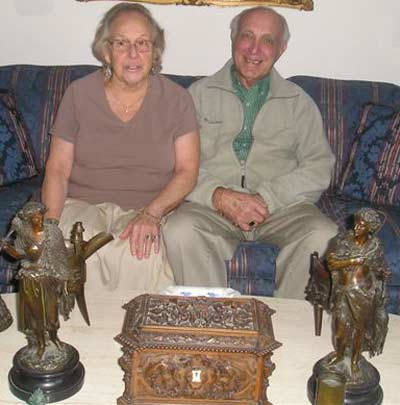
Nina and George Weidinger at home in 2008
When, sixty years later, he finally learned that he was part of an extraordinary team, he says it changed his thinking about his participation drastically. He is very proud of his service, and of the work done by PO Box 1142. It was not until the declassification of many WWII documents that information about PO Box 1142 came out. There was also one man, Brandon Bies, a park ranger, who made it is personal mission to find out everything he could about this group and give them the recognition and honor the secret nature of their work prohibited in the past. It is the National Park Service that is pursuing the story now. 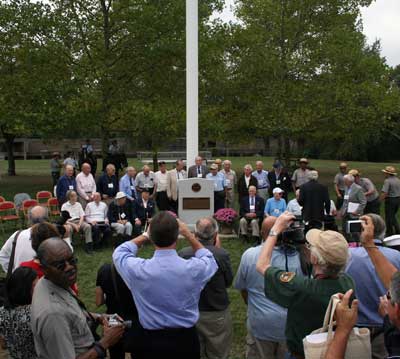
P.O. Box 1142 Veterans at Reunion
George has the special gratitude for Chief Ranger Vincent Santucci and Brandon Bies of the National Park Service in Washington, the originators of preserving the P.O. Box 1142 Ft. Hunt story for History. It was also at their urging that he went to Alexandria Virginia for a reunion of PO Box 1142 personnel, in October 2007. The House of Representatives said, in part, in the passage of HR 753, the following of the work of the veterans of PO Box 1142: "…Whereas after two years of research and planning, the National Park Service held the first ever reunion for the living veterans of Post Office Box 1142 on October 5 and 6, 2007; and Whereas at exactly 11:42 a.m. on October 5, the National Park Service and the living veterans of Post Office Box 1142 raised an American flag in the post's original flagpole setting, and forever memorialized the grounds as the home of Post Office Box 1142: Now, therefore, be it Resolved, That the House of Representatives honors and extends its sincere appreciation to the soldiers of Post Office Box 1142 for their sacrifice to our Nation during a time of war, their pursuit of necessary intelligence through humane means and their service that went too long unacknowledged." It is impossible to venture a guess as to how many lives where saved because of people like George. Historians agree that the work shortened the war by years. 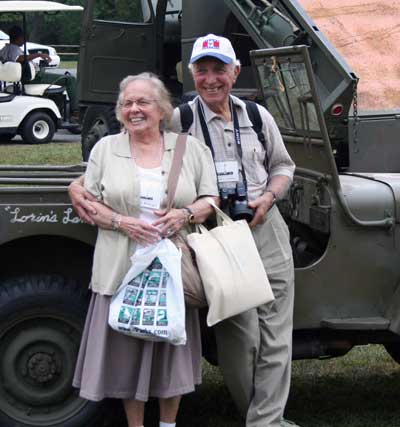
Nina and George Wedinger at Post Office Box 1142 Reunion in Alexandria, VA Oct. 2007
George is now a type of "command central" for the National Parks, assisting in the collection of leads in tracking down the rest of the veterans who were part of the project. They have found 45 so far, none others in the Cleveland area. (There is, however, the descendent of one of the veterans in this area.)When George left the Army, he took a pay cut from 95 cents an hour to 65 cents an hour to work as a draftsman and eventually became a manufacturing engineer. After he left the
Motch & Merryweather Machinery Company he joined Pesco Products, Division of Borg Warner Corp. as a Senior Buyer. 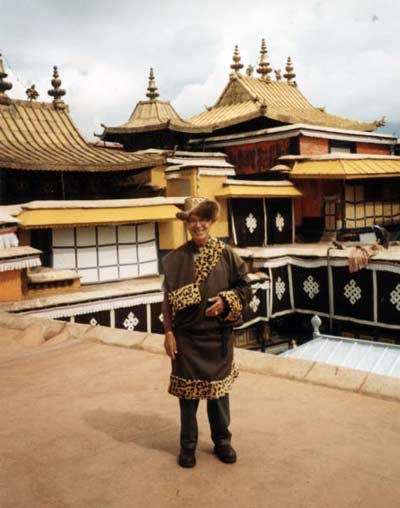
George Weidinger in Tibet in 1994
Ultimately, Picker X Ray asked him to provide non-magnetic stainless steel tools for the MRI. He and a German business acquaintance went into business together and became the sole importers of products, such as the one Picker needed. 2 years later, his partner developed the only titanium tool line available, and they sold that product for 15 years. He is very grateful to this country for the good life he has lead. "This country has given me the opportunity to travel to 78 countries." 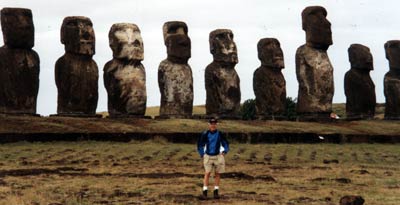
George Weidinger on Easter Island
As a hobbyist photographer, he estimates having more than 20,000 photos - most now on DVD. 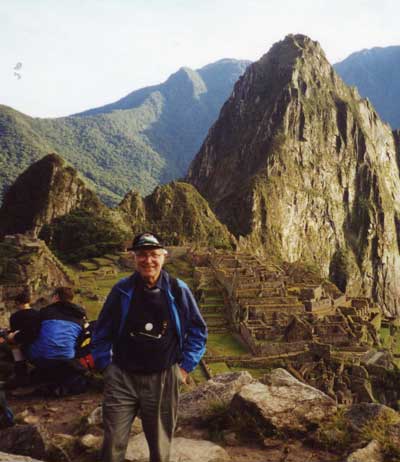
George Weidinger at Machu Picchu
34 years later George made his first return trip to Vienna and to the Church where he was baptized. He looked up the records and found that his name, along with the other male children had "Israel" added to their records and the young girls had "Sarah" added to theirs.
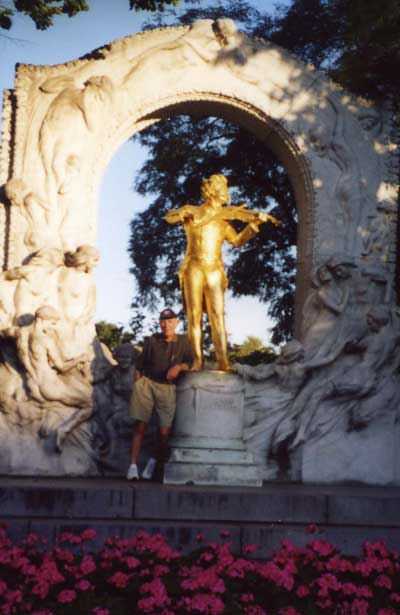
George Weidinger in Vienna in 2003
He returns to Vienna every year. George and Nina have three daughters, three grandchildren and three great grandchildren. "Family is the most important thing to me." George would like people to know what a great country this is even though he says, "the country I came to in 1939 no longer exists." 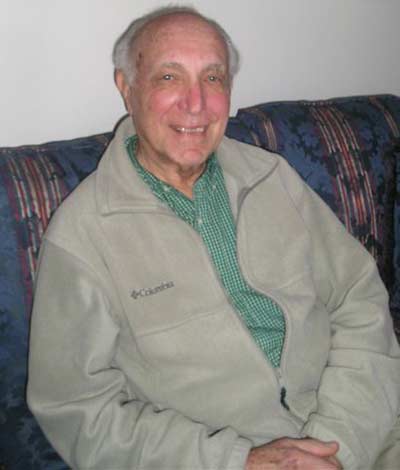
George Weidinger January 2008
He sees some problems but is not concerned: "The country will survive and hopefully the next generation will be strong enough to get back to the original values of the founding fathers."
Profiled by Debbie Hanson (1/08)
Top of Page
Back to Profiles of Cleveland Seniors
|